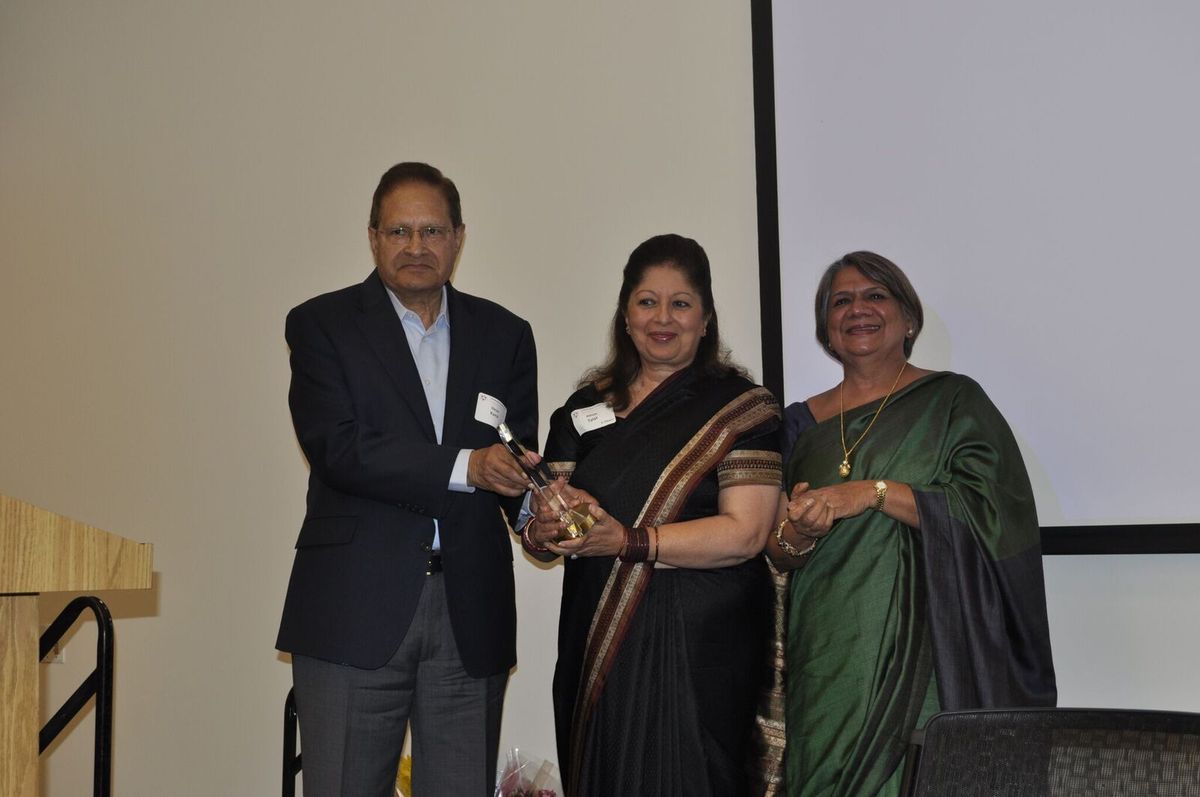UTTAR PRADESH / Saratoga, California, USA :

Menlo Park, Calif. :
Indians for Collective Action, a San Francisco Bay Area-based nonprofit established in 1968 at the UC Berkeley campus with a motto of ‘Development through Innovation’, celebrated its 49th year anniversary with its ‘Annual Awards Banquet’ at the Arrillaga Family Recreation Center here Oct. 28.
The awardees this year were Sonam Wangchuk, founder of the Student Educational and Cultural Movement of Ladakh, and founder of the Himalayan Institute of Alternatives Ladakh; as well as Silicon Valley-based Indian American philanthropists Talat and Kamil Hasan.
The blockbuster Bollywood movie, “3 Idiots,” was in large part based on Wangchuk’s life. He has increased the high school graduation rate in Ladakh’s districts from 5 percent to 70 percent in a decade.
“It is pleasant to see that people from India in this country are connected and caring for the country of their origin. After having worked with schools to bring reforms, to make them future ready, we are now working with higher education universities to create an alternative university that does education as it should be—more engaged and practical rather than just theory, which is what happens in most institutes of higher learning whether in India or the U.S.,” Wangchuk told India-West.
“Just sitting down and listening to lectures is not in harmony with human nature. Youth are not suited for sitting for hours in a classroom. We are a more hands on species and that is how we learn. This is what we are working towards and hoping that it will not only solve the problems of higher education in a place like Ladakh but in other parts of India and the world too,” Sonam added.
“We are working to engage young people to solve real life problems and if it succeeds, the ripple effects will influence universities in rest of India and the world that needs something more engaging than what we currently have,” he continued. “Higher education is too theoretical, up in the air and abstract and not related to life in most places and people feel it. Higher education of today does not prepare you for real life and people are looking forward to something more real than mumbo jumbo of words.”
Working in partnership with dedicated social workers and organizations in India and the U.S., ICA has supported 370 development projects totaling to more than 8.5 million in 25 states in India.
Bhupen Mehta, the organization’s co-president spoke about some of ICA’s projects like SEWA Rural’s IamTeCHO mobile phone technology rolled out by Prime Minister Narendra Modi in cooperation with WHO and UNICEF, as well as the Jaipur Foot Camp Rajkot that has been scaled by Modi in Rajkot.
“I request you all to give your tan, man and dhan (efforts, heart, and wealth) in whichever order that you want to ICA,” Mehta said. “We are getting senior in age and would like to retire. We are looking for youth to take over ICA and run it for the next 50 years.”
The foundation only works with NGOs with guiding principles of secularism, non-partisanship and democracy with a vision of a secure life for every Indian, in a sustainable environment and a just society.
It provides seed funding, ongoing financial resources, moral and technical support to innovative, community-based, scalable development initiatives.
Some of the initiatives of ICA include the youth project helping connect youth in the U.S. with NGOs in India for hands-on social development experience; and its fellowship fund to help activists in India, especially women, in securing opportunities to come to the U.S. for higher training in the areas of environment, women and child development work.
Kamil Hasan expressed his admiration for ICA’s work and went on to say that the main impetus of all the philanthropic activities that he and his wife, Talat Hasan ,have engaged in are to raise the profile of the Indian American community, so that it can make an impact on mainstream American society economically, socially and politically.
He opined that the Jewish community is a good example to emulate and there are four angles — economic success, philanthropy, cultural education and political involvement — that any community keen to raise its profile in U.S., has to work on.
“We have done very well in the area of economic success and fairly well in philanthropy within the community and in India and cultural dissemination via Bollywood movies, actors, yoga, etc.,” Hasan said. “But we have a lot of work to do in expanding our philanthropy to the mainstream community and in political involvement and public service.”
This was followed by a speech on the legacy of philanthropy by Talat Hasan, who amusingly narrated the philosophy passed down by her father, historian and ambassador, Nurul Hasan. She said that her father told her that since she had been privileged by accidental birth, she has an obligation to give back more to society than she had taken.
“I learnt from my parents that working for the community is not a feel-good activity. It is an obligation and should be an integral part of life,” Talat Hasan said. “You should not wait until retirement to do good, and anything that you take on should be sustainable, not just financially but also in such a way that long after you are gone, the work continues.”
source: http://www.indiawest.com / India West / Home> Featured / by Shalini Kathuria Narang, Special to India West / November 02nd, 2017








